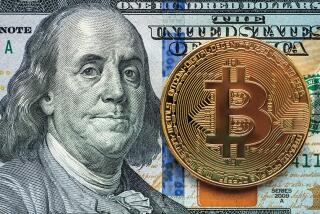Why the dollar is hot again
- Share via
Like any globe-trotter, capital sometimes gets weary or fearful and just wants to go home.
That may best explain the dollar’s latest surge against most rival currencies, including the euro, the British pound and the Australian dollar.
Long a weakling, the greenback now is the muscle among global currencies. If you’re headed overseas, you’ll like this turnabout. If you’re a U.S. exporter who has benefited mightily from the dollar’s long slide, or an investor in foreign stocks, the dollar’s resurgence is trouble.
This week, even as U.S. stock prices dived again, the dollar jumped.
An index that measures the buck’s value against six other major currencies rose 2% for the week, bringing its gain since mid-July to nearly 10%.
The U.S. currency was worth 0.63 euros in mid-July. Now it’s worth 0.70 euros. Expressed the other way, the euro has tumbled from $1.59 in mid-July to $1.42 now.
As with all markets, any explanation of currency market moves has to be taken with a big dose of salt, I’ll readily admit. But two factors make some sense in the dollar’s summer revival.
One is that the plunge in the price of oil and other raw materials has sapped speculators’ enthusiasm for commodities, which had been attracting money in part as a hedge against the dollar’s loss of value since 2001.
It’s not a coincidence that gold has fallen 18% in the last seven weeks while the dollar has rebounded. Gold and the dollar compete with each other for investors’ attention.
The other factor that appears to be bolstering the dollar: Many global investors and currency traders have decided that, even though the U.S. economy is struggling, things are rapidly getting much worse in other countries, particularly Britain, Germany and Japan. Currencies often (though not always) reflect the strength of their home economies.
Worries about overseas economies were fanned this week after the European Central Bank and the Bank of England held their benchmark interest rates steady, despite more signs of stress in their respective economies. That raised more concern that Europe and Britain could fall into serious recessions.
While the U.S. Standard & Poor’s 500 stock index lost 3.2% this week, the British market plummeted 7%. The German market slumped 4.6%.
Losses also were heavy in many emerging markets. Brazil’s main market index slid 6.7% for the week.
In recent days, the talk on Wall Street has been that hedge funds and other investors have been rushing to cash out of long-popular trades, including bets in foreign markets and commodities, and come back to the classic currency of refuge -- the buck.
“What this looks like is global portfolio reallocation,” said Brian Dolan, chief currency strategist at Gain Capital Group in Bedminster, N.J. For the U.S., “Money is being brought home.”
A weekly tally of investor purchases and sales of U.S.- and European-based stock mutual funds, including exchange-traded funds, underscored that shift.
In the seven days ended Wednesday, funds that invest in U.S. stocks took in a net $5.5 billion, the fifth week of inflows in the last six, according to Emerging Portfolio Fund Research Inc. of Cambridge, Mass.
By contrast, funds that invest in stocks worldwide had their fourth straight week of cash outflows, the firm said.
Some hedge funds may be selling assets to raise dollars they might need to meet redemptions by nervous investors who want to cash out, said Sophia Drossos, a currency strategist at Morgan Stanley in New York.
Whatever the motivation, many investors are happy to hold dollars for the first time in years. On Friday, the appetite for greenbacks remained strong even after the government said the U.S. unemployment rate jumped to 6.1% in August from 5.7% in July.
It’s true that the dollar is, in effect, winning by default: It isn’t that investors are bullish on the U.S. economy; they’re just more worried about what they see happening elsewhere around the globe.
A big wild card for the dollar in the short term: the apparently imminent bailout of mortgage giants Fannie Mae and Freddie Mac by the Treasury.
The question is whether that will make global investors feel more confident about the U.S. compared with other economies -- or less so.
--
More to Read
Inside the business of entertainment
The Wide Shot brings you news, analysis and insights on everything from streaming wars to production — and what it all means for the future.
You may occasionally receive promotional content from the Los Angeles Times.








